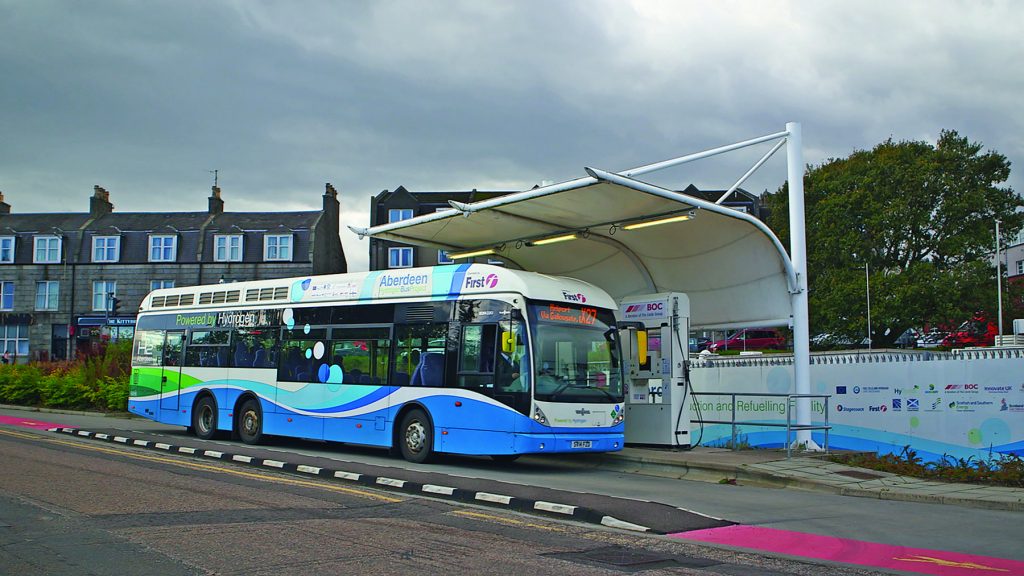
Mark Griffin, Hydrogen Market Development Manager for Clean Fuels at BOC, explains how BOC’s hub funding model for hydrogen refuelling stations can support the government’s strategy to develop hydrogen neighbourhoods and villages.
While renewables can go a long way towards decarbonising our energy use, we will still need to find a replacement for fossil fuels in many industries in order to reach zero by 2050. The most promising solution is hydrogen – which, as well as providing an alternative to coal, oil and gas, offers a flexible way to store surplus renewable electricity.
Hydrogen is already cited as one of the key pillars in the Government’s ten-point plan for a green industrial revolution, but with the publication of ‘Bus Back Better: National Bus Strategy for England’ in March 2021, Government has further signposted hydrogen as a fuel to support its ambition to achieve a net-zero bus fleet. The message from the bus strategy is clear, the government expects “…all LTAs to work with bus operators and energy providers to decarbonise the local bus fleet in their Bus Service Improvement Plans.”
But for councils to be able to decarbonise bus fleets, they need to be able to access hydrogen at a similar price to diesel. The only way to bring down the cost of green hydrogen is to produce it at scale – and for that there has to be sufficient demand. To make the hydrogen dream into a reality, therefore, something needs to happen to break the demand/price deadlock.
The catalyst: hydrogen hubs
The way to break that deadlock is to create hydrogen hubs. Bringing together a number of users to share a hydrogen refuelling facility creates regular demand for hydrogen and maximises the procurement potential for councils. These financial benefits extend to the purchase of vehicles and investment in the hydrogen refuelling station itself. Producing higher volumes of hydrogen helps to reduce the fuel cost per mile so that it is comparable with diesel.
When cities are able to commit to fleets of 50-100 vehicles or more, the economics of hydrogen refuelling change dramatically. Ambitious local authorities looking to drive up demand and produce higher volumes of hydrogen will find a range of different investment models available, including the option to have BOC fund the capital cost of the refuelling station. This removes one of the biggest barriers to local authorities developing hydrogen infrastructure and frees up capital to invest in vehicles.
Like battery EVs, fuel-cell vehicles cost more than today’s internal combustion engine vehicles. However, members of the H2Bus Consortium are working together to produce a single-deck bus at a price around £300,000 leveraging component cost reductions and increased volumes of production.
Hydrogen is a particularly suitable fuel for larger vehicles, such as buses and trucks. It offers a much better vehicle power-to-weight ratio than batteries, which makes it possible to travel long distances without significantly increasing vehicle weight.
Refuelling with hydrogen is a fast and familiar process, which is similar to refuelling a diesel vehicle. It takes around 10 minutes to refuel a bus, which can cover a range of around 350km, and just five minutes for a car giving a range of 500km.
Today, the adoption barriers facing hydrogen are similar to those of battery EVs: lack of refuelling infrastructure and higher vehicle costs. Hydrogen hubs offer a way to overcome those barriers.
The benefits of collaboration
Bringing together a hydrogen hub that serves a multitude of projects helps to realise the full value of hydrogen for transport while offering local authorities a clear strategy and a coherent investment opportunity to decarbonise transport. It helps local authorities to focus on a coordinated scalable hub rather than dealing with numerous, isolated small-scale projects that fail to realise the benefits offered by economies of scale.
A hub demands a collaborative approach between the local authority, fleet operators and other users, vehicle suppliers, sources of funding, an energy supplier or utility and the refuelling station developer. The local authorities are responsible for running various vehicle fleets, including buses and refuse trucks as well as various council vans and cars. Other users can include both public sector organisations such as the NHS and police, while early adopters in the private sector are likely to include taxi fleets, logistics companies, supermarket delivery vehicles and other users that need to travel longer daily distances without the time to recharge batteries.
As well as encouraging businesses to switch to zero-emission vehicles, developing a hydrogen refuelling hub gives private motorists the option to run a fuel-cell car.
A step-by-step approach
BOC’s modular approach to hydrogen refuelling allows hub operators to size their refuelling station to the initial user base and scale up production volumes as demand grows.
Typically, construction takes around 12-months from point of order to being able to refuel. The hydrogen supply is key, which can either be delivered to site from an offsite production plant or produced onsite. To produce hydrogen on-site, an electrolyser is required to extract hydrogen from water. A compressor unit takes the extracted hydrogen and compresses it for efficient storage. The station also requires a hydrogen store, which is capable of storing hydrogen under pressure, and a dispenser for pumping the hydrogen gas to the vehicle under pressure.
Hubs can produce green hydrogen on-site by using renewable energy to power the electrolysis process, either from local renewable energy sources or by using an energy company that offers a green tariff.
How to get involved
Hydrogen is no longer a futuristic fuel – it is proven technology. The Kittybrewster Hydrogen Refuelling Station in Aberdeen, for example, is already providing reliable and affordable energy for a new generation of zero-emission vehicles. If you’d like to find out more about creating a hydrogen hub, BOC has produced a helpful guide with everything you need to know: Decarbonising Transport with Hydrogen Hubs.


